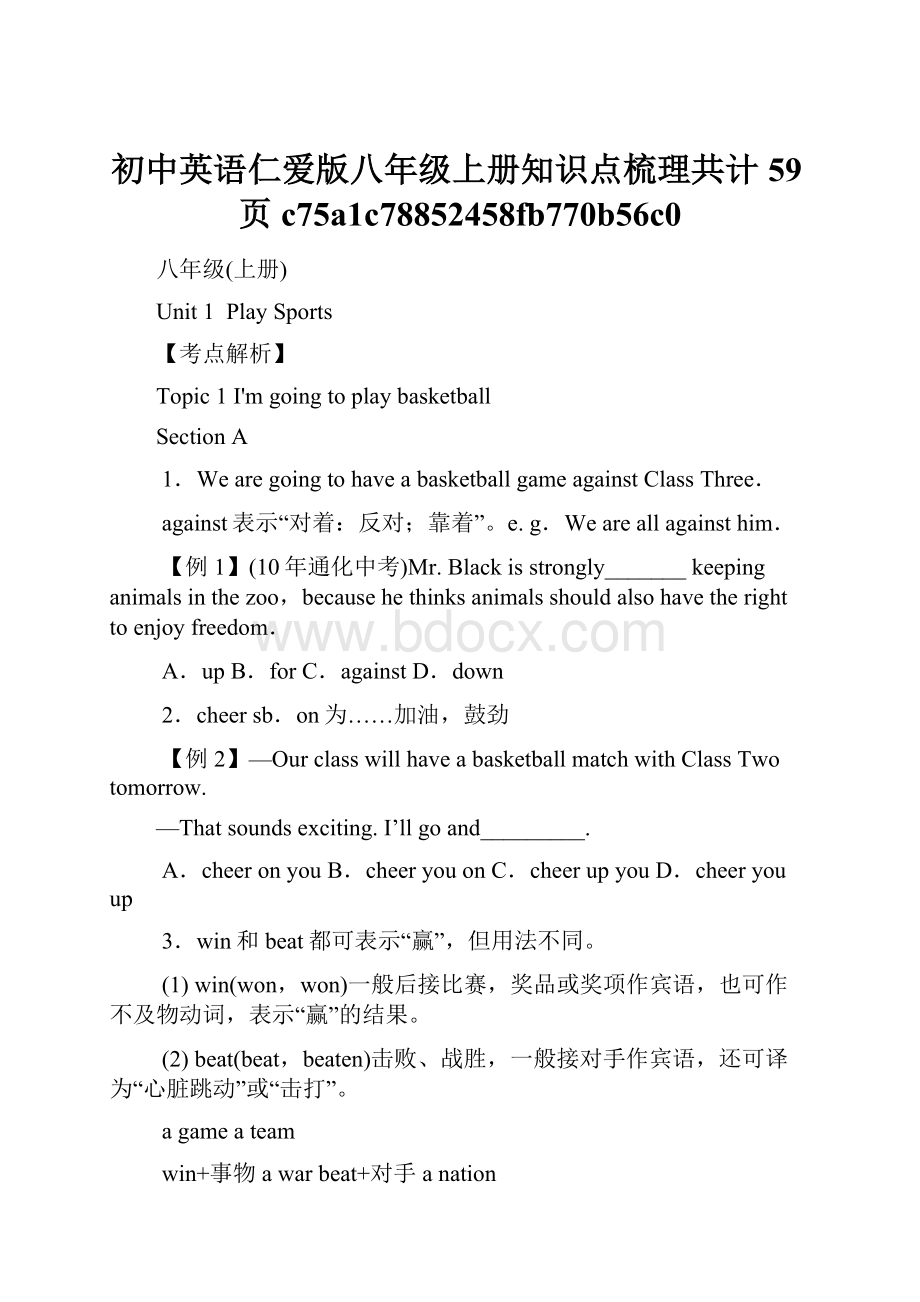 初中英语仁爱版八年级上册知识点梳理共计59页c75a1c78852458fb770b56c0.docx
初中英语仁爱版八年级上册知识点梳理共计59页c75a1c78852458fb770b56c0.docx
- 文档编号:27492485
- 上传时间:2023-07-02
- 格式:DOCX
- 页数:107
- 大小:101.20KB
初中英语仁爱版八年级上册知识点梳理共计59页c75a1c78852458fb770b56c0.docx
《初中英语仁爱版八年级上册知识点梳理共计59页c75a1c78852458fb770b56c0.docx》由会员分享,可在线阅读,更多相关《初中英语仁爱版八年级上册知识点梳理共计59页c75a1c78852458fb770b56c0.docx(107页珍藏版)》请在冰豆网上搜索。

初中英语仁爱版八年级上册知识点梳理共计59页c75a1c78852458fb770b56c0
八年级(上册)
Unit1PlaySports
【考点解析】
Topic1I'mgoingtoplaybasketball
SectionA
1.WearegoingtohaveabasketballgameagainstClassThree.
against表示“对着:
反对;靠着”。
e.g.Weareallagainsthim.
【例1】(10年通化中考)Mr.Blackisstrongly_______keepinganimalsinthezoo,becausehethinksanimalsshouldalsohavetherighttoenjoyfreedom.
A.upB.forC.againstD.down
2.cheersb.on为……加油,鼓劲
【例2】—OurclasswillhaveabasketballmatchwithClassTwotomorrow.
—Thatsoundsexciting.I’llgoand_________.
A.cheeronyouB.cheeryouonC.cheerupyouD.cheeryouup
3.win和beat都可表示“赢”,但用法不同。
(1)win(won,won)一般后接比赛,奖品或奖项作宾语,也可作不及物动词,表示“赢”的结果。
(2)beat(beat,beaten)击败、战胜,一般接对手作宾语,还可译为“心脏跳动”或“击打”。
agameateam
win+事物awarbeat+对手anation
aprizeanapponent(对手)
e.g.Inthe29thOlympicGames,Phelpsbeattheothersuimmersandwon8goldmedalshimself.在第29届奥运会上,菲尔普斯战胜其他游泳运动员,一人独获8金。
【例3】(10年福州中考)Myfavouritefootballteamwas_______(beat)intheCupFinal.
【例4】—Ourteam_________thematch.We’vegotthefirstplace!
—Welldone!
Congratulations!
A.hitB.beatC.wonD.watched
【考点链接】beat/win
(1)They________thebasketballmatchyesterday.
(2)Byhardworkshe________thefirstplaceinthemathexam.
(3)Hecanalways________meatchess.
(4)It'sdifficultto__________Class3.Theyhaveseveralgoodplayers.
【分析比较】这两个词中都有“赢”的意思。
但beat的宾语是对手,即表示人的名词或代词,也可指打破纪录。
win的宾语是表示比赛、奖品、胜利或荣誉等的名词或代词。
(1)的宾语是“比赛”,应填won。
(2)的宾语是“名次”,应填won。
(3)和(4)的宾语为“代词和表示人的名词”,故填beat。
4.prefer宁愿,更喜欢
(1)preferdoingsth.todoingsth.跟做某事比较起来更喜欢做某事prefersb./sth.tosb./sth.跟某人/某物比较起来更喜欢人/某物
(2)prefertodosth.(rather)thandosth.跟做某事比较起来更喜欢做某事
(3)prefertodosth.更喜欢做某事
【例5】(10年安徽中考)—DoyouoftenwatchManandNatureonTV?
—Sometimes.It'saninterestingprogram,butI_______SportsNews.
A.preferB.wantC.enjoyD.miss
5.join/takepartin
(1)join参加某个政党,团体,组织等,成为其中的一员
(2)joinsb.(indoingsth.)和某人一起(做某事)
(3)joinin=takepart,in参加某项活动
【例6】(09年包头中考)Theweinsarewalkingthebook“whomovedmycheese”,it’sfunto__________them.
A.joinB.joininC.takepartinD.enter
6.alittle/abit
(1)作状语,修饰比较级e.g.Heisabit/alittleolderthanyou.
(2)作主语或宾语e.g.Pleasegivemeabit/alittle.
(3)与not连用时notabit=notatallnotalittle=verymuche.g.Heisnotalittletired.他非常累。
Heisnotabittired.他一点也不累。
(4)作定语修饰不可数名词alittle(of)=abitof
(5)quiteabitof后只能接不可数名词。
quitealotof可接可数或不可数名词。
quiteafew后只能接可数名词。
【例7】(09年上海中考)TheAmericanstudentcouldspeakonly_________Chinese,buthemanagedtocommunicatewithus.
A.fewB.alittleC.afewD.little
SectionB
1.playforateam为某队效力bein/ontheteam在某队打球
【例8】Tomlikesbasketballverymuch.Hewantstoplay________theNBAwhenhegrowsup.
A.withB.forC.ofD.to
2.dream作名词,“梦,梦想”。
e.g.mydreamjob也可作动词dreamof/aboutsth./doingsth.
【例9】LastnightIdreamt_______aloneinthemountains。
A.ofrunB.ofrunningC.torunD.ran
3.“oneofthe+形容词最高级+名词的复数”意思是“最……之一”。
e.g.Heisoneofthebestbasketballplayers.Ilikehimverymuch.但它作主语时,谓语应用单数。
Oneofthetallestboysintheteamisfromourclass.
【例10】(10年莆田中考)TheGreatWallofChinaisoneof________wondersintheworld.
A.greatB.BgreaterC.thegreatest
4.breaktherecord打破记录
5.inthe2008BeijingOlympics在2008年北京奥运会中。
“在……比赛中”用in
e.g.intherace/inthebasketballgame
6.giveup放弃。
注意应该把介词放在中间。
e.g.giveitup,giveupdoingsth.放弃做某事。
【例11】(10年莆田中考)Smokingisharmfultopeople'shealth,youshould____it_____(放弃).
7.WhataShame=Whatapity真遗憾!
【例12】(10年龙岩中考)一ImissedthewonderfulbasketballMatch.
A.NoproblemB.WhatapityC.Notatall
SectionC
1.spend/cost/pay/take
(1)spend作“花费”之意时,指花费时间/精力/财力在某事或某物上,主语是人。
(2)cost主要指花费金钱/时间/劳力/精力等。
主语是某物或某事。
其结构是sth.costssb….
(3)paysb,酬谢某人,pay…for…可等同于spend…on…,或用cost作同义句转换。
e.g.Hepaid20yuanforthedictionary.=Hespent20yuanonthedictionary.=Thedictionarycosthim20yuan.payforsth.为……付款e.g.Hehaspaidforthecoat.
(4)take一般指花费时间,其主语是名词或动名词,经常用it作形式主语。
【例13】It’stakeusaboutaweek_______themachine.
A.tomendB.mendC.mendedD.mending
【考点链接】spend/take/cost/pay
(1)Thegirl________thirtyyuanonthescarfyesterday.
(2)Howmuchdidthatshirt________you?
(3)I________fivedollarsforthebookjustnow.
(4)It_________metwohourstofinishmyhomeworkeverynight.
(5)I'll________forthetickets.
(6)They___________halfadayvisitingtheGreatWall.
【分析比较】四者都有花费的意思。
spend后接金钱或时间,常用结构为sb.spendsmoney/timeonsth.或sb.spendsmoney/time(in)doingsth.。
(1)题意为“昨天这个女孩花三十元钱买了条围巾”,故填spent。
(6)题意为“他们用了半天参观长城”,故填spent。
cost花费金钱、时间等,主语必须是物或用it作形式主语。
(2)题意为“这件衬衫花了你多少钱”,故填cost。
pay常与for连用,主语为人。
payforsth./paymoneyforsth.(3)题意为“刚才我花了5美元买这本书”,故填paid。
(5)题意为“我会付这些票的饯”,故填pay。
take多指花费时间,常用句型Ittakessb.sometimetodosth.(4)题意为“每晚我要花两个小时来完成作业”,故填takes。
2.doexercise=playsports做运动,锻炼
3.Therebe句型的将来时结构为Thereis/aregoingtobe或Therewillbe。
注意在Therebe句型中不能出现表示“有”的have和has。
【例14】—There_______afunnyfilmtonightinourschool.Wouldyouliketoseewithme?
—I'dliketo,butIhavetodomyhomework.
A.isB.haveC.isgoingtohaveD.isgoingtobe
4.thehighjump跳高thelongjump跳远
5.sure
(1)besurethat+从句e.g.Iamsurethatheisright.
(2)sb.besuretodosth.某人一定会做某事。
强调说话人的语气。
e.g.Theyaresuretocomeearly.=Iamsurethattheywillcomeearly.
(3)besureof/aboutsth./doingsth.“确信”,表示主语对……有把握。
e.g.Iamsureofsuccess.=IamsureIwillsucceed.
(4)用在祈使句里Besure(not)todosth.一定(不)做某事e.g.Besuretocomehereearly.
【例l5】(10年福州中考)—I'mnotsure__________therearelivingthingsonotherplanetsornot.
—Evenscientistsaren'tsureaboutit.
A.whetherB.whereC.why
6.make的用法。
(1)makesb.dosth.使某人做某事。
被动语态中要还原to。
(2)“makesb./sth.+形容词”使某人或某物处于某种状态。
e.g.Therainydaysmakemesad.(3)makesth.forsb.—makesb.sth.为某人制作……
【例16】Hiswordsmadeus_________(feel)uncomfortable.
7.begoodfor“对……有益”,反义词组是bebadfor“对……有害”。
8.keephealthy=keepfit保持健康
【例17】_________(保持健康)isveryimportantforUSbecausehealthiseverything.
SectionD
1.playagainst跟……进行比赛e.g.Wouldyouliketoplayagainstus?
【考点链接】playwith/playagainst/playfor
(1)Ourteamwill__________ClassThreenextSaturday.
(2)Agroupofkidswere________aballinthestreet.
(3)DoesYaoMing__________theHoustonRocketsintheNBA?
【分析比较】playwith玩耍,游戏,玩乐,与……玩耍。
(2)题意为“孩子们在玩球”,故填playingwith。
playagainst同……比赛。
(1)题意为“两个队比赛”,故填playagainst。
playfor为……效力。
(3)题意为“姚明在NBA为休斯敦火箭队打球吗?
”,故填playfor。
2.leave…for…离开某地去某地leavefor=setofffor出发去某地.
【例18】(10年龙岩中考)—I'mleavingforShanghaitovisittheExpo2010thisweekend.
—__________.
A.WelldoneB.IhopesoC.Haveagoodtripe
3.一般将来时
(1)含义:
表示将来某个时间要发生的动作或是存在的状态,也表示将来经常或反复发生的动作,常与表示将来的时间状语连用,如:
tomorrow,soon,lateron,nexttime(week,month,year,Sunday…)等。
(2)结构为begoingtodosth.或willdosth.。
Therebe句型的将来时结构为Thereis/aregoingtobe或Therewillbe。
注意在Therebe句型中不能出现表示“有”的have/has。
(3)表示位置移动的动词go,come,leave,fly,start等可以用现在进行时表示将要发生的事。
其中go和come一定要用现在进行时表示将来。
【例19】(10年河北中考)Thisterm________over.Thesummervacationiscomingintwoweeks.
A.isB.wasC.hasbeenD.willbe
【例20】(10年重庆中考)Ifyou___________tothe2010ShanghaiExponextweek,Iwillgowithyou.
A.goB.hasgoneC.willgoD.aregoing
【考点解析】
Topic2Wouldyoumindpassingmesomewater?
SectionA
1.would/could/willyou(please)dosth.“请你做……好吗?
”表示委婉请求对方做某事,否定结构是would/could/willyou(please)notdosth.。
e.g.Wouldyoupleasenotplaythepianoloudly?
【例1】(10年陕西中考)Hi,Jack.Wouldyouplease_____________thepictureonthewall?
A.toputupB.putupC.setupD.tosetup
2.fallill“生病”,beill“生病的”,强调一种状态。
feelill“感觉不舒服”,强调一种身体感受。
falldown摔倒,跌倒。
【考点链接】sick/ill
(1)The________childneedshelp.
(2)Hisgrandmaisstill________inbed.
【分析比较】sick“生病的,有病的”。
主要用于美式英语,可以用作定语,也可以用作表语。
故
(1)和
(2)两题都可以填sick。
ill与sick同义,ill主要用于英式英语,且通常不作定语,只用作表语。
故
(1)不能填ill,只有
(2)可填ill。
3.mind的用法
(1)作动词,表示“介意”,常用于疑问句或否定句中。
其结构是mindsb./sth./doingsth.。
e.g.Idon'tmindalittlemorehomework.Wouldyoumindme/mysmokinghere?
=WouldyoumindifIsmokehere?
对wouldyoumindsb./sb.'sdoingsth.及“wouldyoumindif+从句”的回答,如果是表达“会介意”,可用Yes,you'dbetternot./IamsorrybutIdo.如果表达“不会介意”,可用No,notatall./Nevermind./Itdoesn'tmatter./No,ofcoursenot.
(2)用于提出建议。
Wouldyouminddoingsth./wouldyoumindnotdoingsth?
对Wouldyouminddoingsth.的回答可以用Ofcoursenot,Iwilldoitrightaway./Sorry.Iwilldoitrightaway.对wouldyoumindnotdoingsth.的回答可以用Sorry,Iwon'tdoitagain./I'msorryaboutthat.
(3)作动词,“注意,当心”。
e.g.Mindthewetpaint.
(4)作名词,“思想”。
setone'smindtodosth./onsth.专注于做某事
【例2】(10年宁德中考)Mygrandparentsaresleepinginthebedroom.Wouldyoumindmy__________TV?
—Certainlynot.Wecangooutforawalk.
A.turningonB.turningoffC.turningup
【例3】(10年安徽中考)—Ihopeyoudon'tmindmyopeningthewindow.
—________.It'smuchtoohotinhere.
A.CertainlyB.OfcoursenotC.AllrightD.Nevermind
4.beglad/happytodosth.乐意做某事
【例4】Ithinkeveryoneisglad_________morefriends.Youknow,morefriends,moreroads.
A.makeB.makingC.tomakeD.makes
5.practicesth./doingsth.练习做某事
【例5】(09年上海中考)Susanfinallybecameapopularsingeraftershepracticedforyears.
A.singB.tosingC.singingD.sang
SectionB
1.bealwaysdoingsth.老是……,含有抱怨的感情色彩。
e.g.LiuMingisalwaysfightingwithhisfriends.
【例6】—Tom,don'tbealways______forschool.—Iamverysorry.Iwon't.
A.belateB.lateC.beinglateD.lating
2.careless形容词,反义词是careful。
carelessly副词,反义词是carefully.
【例7】(09年上海中考)Becareful!
There'ssomebrokenglassontheground.Theunderlinedpartmeans________.
A.LookoutB.GoaheadC.GetreadyD.Keepquiet
3.chance机会haveachancetodosth.有机会做某事getachancetodosth.得到一个机会做某事
【例8】(08年潍坊中考)IamsureIcanmakeitbetter,ifourteacher_________measecondchance.
A.giveB.gaveC.givesD.wil
- 配套讲稿:
如PPT文件的首页显示word图标,表示该PPT已包含配套word讲稿。双击word图标可打开word文档。
- 特殊限制:
部分文档作品中含有的国旗、国徽等图片,仅作为作品整体效果示例展示,禁止商用。设计者仅对作品中独创性部分享有著作权。
- 关 键 词:
- 初中英语 仁爱 年级 上册 知识点 梳理 共计 59 c75a1c78852458fb770b56c0
 冰豆网所有资源均是用户自行上传分享,仅供网友学习交流,未经上传用户书面授权,请勿作他用。
冰豆网所有资源均是用户自行上传分享,仅供网友学习交流,未经上传用户书面授权,请勿作他用。
链接地址:https://www.bdocx.com/doc/27492485.html


 《崔万志演讲观后感》.docx
《崔万志演讲观后感》.docx
